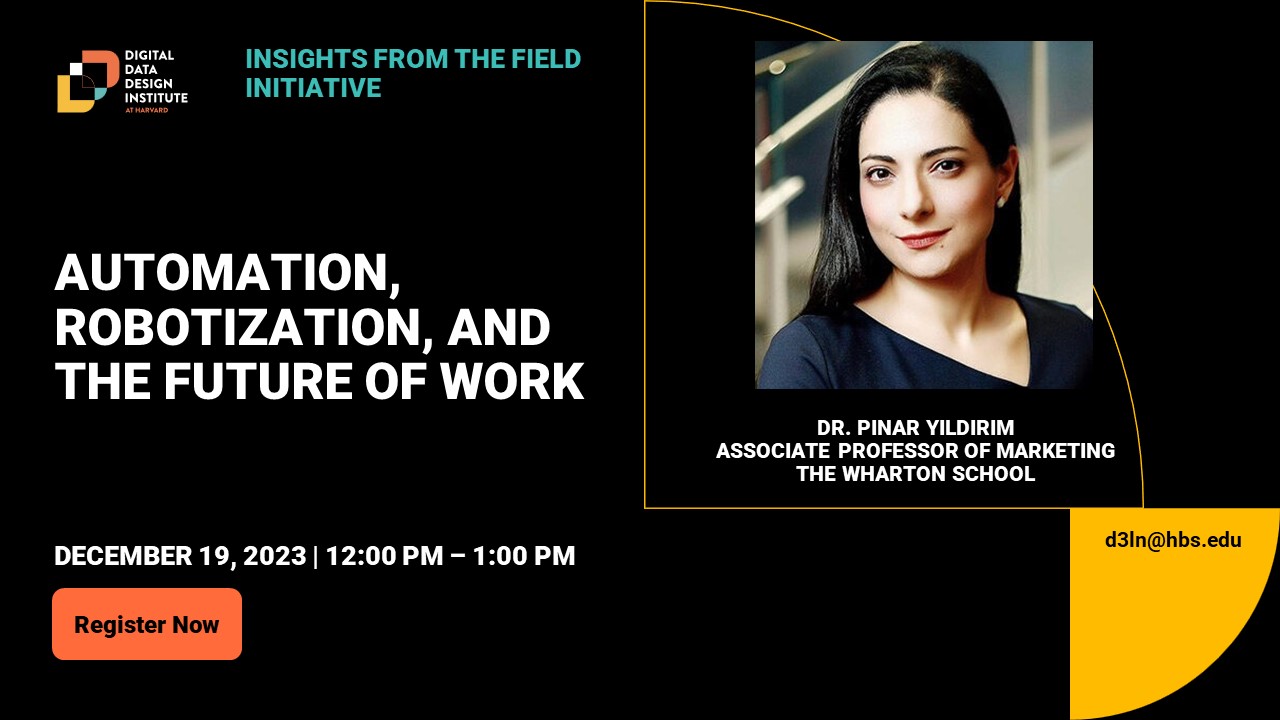The following insight is derived from a recent ‘Insights from the Field’ event featuring Prof. Pinar Yildirim on the topic of Automation, Robotization, and the Future of Work.
Meet Our Guest Contributor:
Pinar Yildirim | Associate Professor of Marketing at the Wharton School

Dr. Yildirim studies technology, media, and information economics. Her research focuses on applied theory and applied economics of online platforms, advertising, networks, media, and politics.
For more information, please view Dr. Yildirim’s faculty profile at the Wharton School.
Introduction: Why does this matter?
Work, the workforce, and the workplace is subjected to constant disruption primarily as a result of advancements in technology. Weather it is the impact of robotization to manual work or the disruption of knowledge-based work as a result of software-enabled innovation, career values are being redefined to accommodate for the evolving nature of work. This begs many questions, most importantly, the short and long-term implications of such advancements in technology to the concept of work as we ‘used’ to know it and by extension the values we associate with our careers. Using a novel data of resumes from 16 million individuals in the United States, this research study shades light on the existential question of technological disruption to the labor market and its impact on career values.
The Problem: What is the research question and what is the specific problem it attempts to answer?
The research study discussed at this ‘Insights from the Field’ event focuses on the various impacts of automation on workers’ career values. Specifically, the study examines how the increasing integration of robots and automation in various industries affects individual workers’ career trajectories, including their occupation value and mobility, wage changes, and long-term career prospects. The study also explores the broader implications of these changes, such as their influence on individuals’ choices and decisions across different domains, including political preferences.
The Solution: What are the main findings of the research and what solutions do these findings point to?
Notable findings of the research study include the differential impacts of automation across various occupations and industries, particularly the manner with which automation has led to changes in the tasks workers are responsible for and the decision-making hierarchy within organizations, potentially affecting how employers and employees envision career paths. The study provides evidence of automation not only affecting immediate job displacement and wage changes, but also exerting a profound and long-term impact on workers’ career trajectories by potentially altering their future employment opportunities and bargaining power. The study uses extensive data analysis to measure career value changes and exposure to robotization, in order to establish a clearer understanding of the relationship between automation and career values across different sectors and occupations.
In general, the main findings of the research study can be summarized as follows:
- Automation significantly affects the career value of individual workers, including and primarily the value of holding a particular occupation and its estimated future earning potential. As such, an increase in automation indicates a notable decline in career value and a decrease in opportunities for career advancement and potentially lower future earnings.
- The effects of automation are not uniformly distributed across all sectors. While the manufacturing industry is of specific interest due to its heavy exposure to automation, the impacts of automation spill over into other industries such as retail, services, and healthcare, affecting a broader range of occupations beyond those that directly interact with robots.
- The implications of automation extend beyond immediate job displacement and wage changes, affecting long-term career prospects. Workers may find their jobs evolving or even disappearing, as well as the tasks and responsibilities within their roles shifting due to the integration of automation technologies. In a similar vein, automation contributes to changes in wage structures and occupational mobility. A significant portion of the negative effect of automation on career value comes from reduced wages and a decline in occupational mobility, leaving workers with fewer opportunities to move to higher-paying jobs or advance within their careers.
Automation influences not only economic outcomes but also social behaviors and political preferences. For example, regions with higher exposure to automation experience changes in household consumption, investment in education and housing, and even in voting patterns as a result of automation, punctuating the overarching economic and societal impact of advancements in technology.
The Implications: What are the broader implications of this study for policy and practice, and what could be done to mitigate the negative impacts of automation and robotization?
Based on these findings, several recommendations for policy and practice emerge in order to better prepare for a future of work that is inextricably connected with technology, and to mitigate the negative impacts of technological disruptions such as automation and robotization. Some of the recommendations include:
- Leading with education is paramount. Increasing access to high-quality education and vocational training can equip workers with the skills needed to thrive in an increasingly automated workplace. This primarily consists re-skilling and up-skilling efforts particularly in emerging industries and technologies. In addition, fostering collaborations between government entities, higher education institutions, and the private sector can make sure the essence of training programs and initiatives are aligned with the needs of the future workforce.
- Strengthening social safety nets can help cushion the economic impact of automation on workers, especially those who have been affected directly. This could include unemployment benefits, healthcare coverage, and income support schemes.
- Offering career counseling and professional development support can assist workers in navigating the transitional and at times turbulent job landscape by helping them identify new opportunities and make informed career decisions.
- Encouraging investment in sectors less susceptible to automation, such as healthcare, education, and creative industries, can create new job opportunities that leverage human skills and creativity.
- Developing regulatory and policy frameworks that guide the ethical and equitable deployment of automation technologies can ensure the benefits as well as burdens of automation are fairly distributed across society.
Overall, it’s important to acknowledge and understand the nuanced effects of automation on the workforce: the impacts are not uniformly negative but vary significantly based on occupation, industry, and education level. This research study calls for a deeper investigation into the mechanisms through which automation reshapes career trajectories and the broader economic and social implications of these changes in regions other than the United States.
Further Exploration & Resources
An important topic worthy of further exploration in the world of automation and career values is the ways in which disruption to work and the workforce as a result of robotization could be different from the kind of disruption caused as a result of software-based technologies. In other words, exploring the nature and magnitude of the disruption to manual work as compared to knowledge-based work as a result of exponential advancements primarily in Artificial Intelligence and Machine Learning technologies.
- Automation, Career Values, and Political Preferences (original paper)
- Robots and Jobs: Evidence from US Labor Markets (Acemoglu and Restrepo, 2019
- Microsoft New Future of Work Report 2023
Disclaimer
The “Insights from the Field” initiative is a platform for guest contributors – who are industry leaders, subject-matter experts, and leading academics – to share their expert opinions and valuable perspectives on topics related to the fields of Business, Artificial Intelligence (AI), and Machine Learning (ML). Our guest contributors bring a wealth of knowledge and experiences in their respective fields, and we believe that their insights can significantly enrich our community’s understanding of the dynamic and intertwined spaces of business, technology, and society.
It’s important to note, however, that the Digital, Data, and Design (D^3) Institute does not explicitly endorse opinions expressed by our guest contributors. With this initiative, we hope to facilitate the exchange of diverse perspectives and encourage critical thinking, with an overarching goal of fostering meaningful and informed discussions on topics we consider are important to our community.
